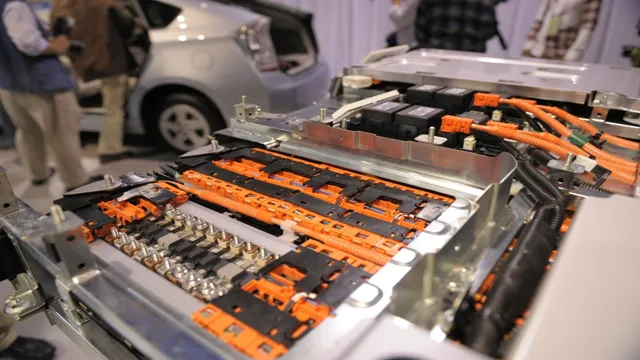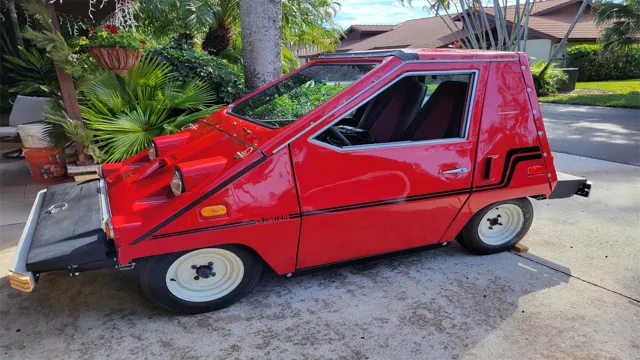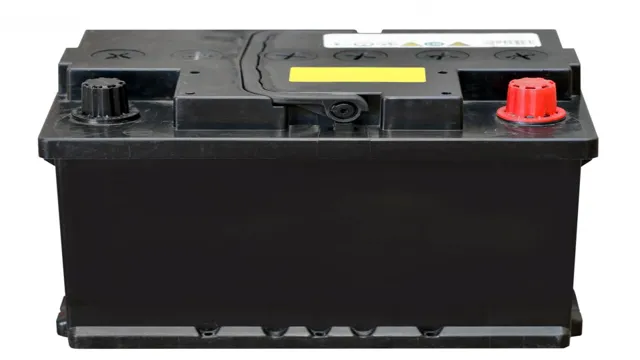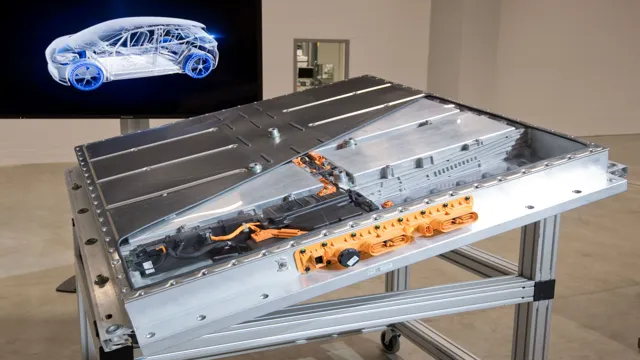Powering Up: Unraveling the Truth Behind Electric Car Batteries – Are They All Lithium-Ion?
When it comes to the batteries that power electric cars, there’s a lot of confusion and misinformation out there. One question that comes up a lot is whether electric car batteries are lithium-ion. The short answer is yes – most electric vehicles (EVs) today use lithium-ion batteries.
But what exactly does that mean? Well, lithium-ion batteries, or Li-ion batteries for short, are a type of rechargeable battery that uses lithium ions as the primary material for the cathode and anode. They’re popular in EVs because they have a high energy density, meaning they can store a lot of energy in a small space, and they’re also relatively lightweight. Of course, there are other types of batteries out there too, including nickel-metal hydride and lead-acid batteries.
But these days, Li-ion batteries are the most commonly used type of battery in electric cars. They’re also used in a variety of other applications, including laptops, cell phones, and even some power tools. So if you’re in the market for an electric car, you can rest assured that the battery powering your vehicle will likely be a lithium-ion battery.
And if you’re interested in learning more about how these batteries work, the benefits they offer, and any potential downsides, there’s plenty of information out there to help you better understand this important technology.
What Are Lithium-Ion Batteries?
Are electric car batteries lithium-ion? Yes, they are. Lithium-ion batteries are the most commonly used type of battery in electric cars due to their high energy density and long lifespan. The battery pack is typically made up of several individual cells, each containing a positively charged cathode, a negatively charged anode, and an electrolyte solution that allows for the transfer of ions between the electrodes.
When the car is being driven, the lithium ions flow from the anode to the cathode, providing the electric current that powers the vehicle. However, it’s important to note that there are many different types of lithium-ion batteries with varying chemistries and characteristics. Some are better suited for high-power applications like driving, while others are better for stationary storage.
As electric cars become more popular, manufacturers are investing heavily in the development of new and improved battery technology to improve range, reduce cost, and increase safety.
Definition and Composition
Lithium-ion batteries are rechargeable batteries that have become ubiquitous in our daily lives. These batteries are so common that they are found in almost all portable electronics including smartphones, laptops, and tablets. They are also used in electric cars and power grids.
The main components of lithium-ion batteries are a positive electrode made of lithium cobalt oxide, a negative electrode made of graphite carbon, and an electrolyte made of salts and organic solvents. Lithium-ion batteries have several advantages over other battery chemistries including high energy density, low self-discharge, and long cycle life. These properties make them perfect for modern electronic devices that require long-lasting and high-performance power sources.
Benefits and Drawbacks
Lithium-ion batteries have become a popular choice for many devices and applications due to their high energy density and long lifespan. These rechargeable batteries are made up of lithium cobalt oxide or lithium iron phosphate, which store and release energy through a chemical reaction. The benefits of lithium-ion batteries include their high energy density, which allows them to store more energy in a smaller size, and their ability to hold a charge for long periods of time.
They also have a low self-discharge rate, meaning they can hold their charge for up to several months without losing power. However, there are also some drawbacks to lithium-ion batteries. They can be prone to overheating and can be dangerous if not used and stored properly.
Additionally, they can be expensive to produce and may require special handling when it comes to disposal. Despite these drawbacks, lithium-ion batteries remain a popular choice for a wide range of applications, from smartphones and laptops to electric vehicles and renewable energy systems.
Types of Electric Car Batteries
One of the most common types of electric car batteries is the lithium-ion battery, which are highly efficient and widely used. However, there are also other types of batteries used in electric vehicles such as nickel-metal hydride, lead-acid, and solid-state batteries. Each type of battery has its own unique advantages and disadvantages, and are used in electric cars for different purposes.
For instance, nickel-metal hydride batteries are less expensive than lithium-ion batteries and are often used in hybrid electric vehicles. Solid-state batteries are a promising technology for the future as they are expected to have higher energy density and faster charge times compared to existing batteries. Despite the different types of batteries used in electric vehicles, lithium-ion batteries remain the most common type in use today.
They are efficient, have a long lifespan and can deliver high power at a low weight, making them ideal for use in electric cars.
Overview of Different Battery Technologies
When it comes to electric car batteries, there are several types of battery technologies available to choose from. One of the most common types is the lithium-ion battery, which is known for its high energy density, long lifespan, and fast charging abilities. Another popular option is the nickel-metal hydride battery, which is less expensive than lithium-ion and can be found in older model electric cars.
However, it has a shorter lifespan and lower energy density. Lead-acid batteries, which are commonly used in gas-powered cars, can also be used in electric cars but are less efficient and require frequent maintenance. Other types of electric car batteries include solid-state batteries, zinc-air batteries, and flow batteries.
It’s important to consider the pros and cons of each type before choosing the right battery for your electric car. This decision will impact the performance, range, and cost of your vehicle.
Comparison of Lithium-Ion vs Other Battery Types
When it comes to electric cars, one of the most important components is the battery. There are several types of batteries used in electric cars, each with its own pros and cons. The most common type of battery used in electric cars is the lithium-ion battery.
Lithium-ion batteries are light and compact, making them ideal for use in electric cars. They also have a high energy density, which means they can store a lot of energy in a small space. This makes them a good choice for electric cars as they can provide a lot of power without taking up too much space.
However, lithium-ion batteries can be sensitive to high temperatures, and over time, they will degrade, reducing their performance. Other types of batteries used in electric cars include nickel-metal hydride (NiMH) batteries and solid-state batteries. NiMH batteries are cheaper than lithium-ion batteries but have a lower energy density.
Solid-state batteries, on the other hand, have a higher energy density than lithium-ion batteries and are less sensitive to high temperatures but are still in the early stages of development. Overall, the choice of battery will depend on the specific needs of the electric car, such as range and performance, as well as cost and availability. Ultimately, the goal is to find the right balance between performance, cost, and environmental impact.
Lithium-Ion Batteries in Electric Cars
Yes, electric car batteries are mostly lithium-ion (Li-ion) batteries. Lithium-ion batteries have become the go-to battery technology for electric cars due to their high energy density, longer lifespan, and superior performance. Compared to traditional lead-acid batteries, Li-ion batteries provide longer ranges, faster charging times, and can hold their charge for longer periods.
Additionally, lithium-ion batteries are more environmentally friendly as they contain fewer toxic materials and are easier to recycle. Another advantage of Li-ion batteries is their ability to withstand high temperatures, important for electric car batteries as they generate a lot of heat during use. Despite their advantages, Li-ion batteries can still present some challenges such as potential safety issues and high cost, but overall, they are the preferred battery technology among electric car manufacturers.
How They Work in Electric Vehicles
Lithium-ion batteries have revolutionized the electric car industry, allowing for longer driving ranges and faster charging times. These batteries work by using a chemical reaction between lithium ions and a cathode to create electrical energy. When the car is in use, the lithium ions move from the anode to the cathode and back again, creating a flow of electricity that powers the vehicle.
The efficiency and durability of lithium-ion batteries have improved significantly over the years, making them a reliable and cost-effective option for electric cars. However, they are not without their drawbacks. Despite being more environmentally friendly than traditional fuel-powered vehicles, lithium-ion batteries still require significant amounts of energy and resources to produce.
Additionally, their limited lifespan and potential safety hazards make proper disposal and recycling crucial. Nonetheless, as research continues to develop, lithium-ion batteries hold great promise as a crucial component in the future of electric vehicles.
Advantages and Disadvantages in Comparison to Other Battery Types
When it comes to electric cars, one important factor to consider is the type of battery used. Lithium-ion batteries have become a popular choice, offering numerous benefits over other battery types. For example, they provide a high energy density, meaning they can store more energy in a smaller space.
This makes them ideal for electric cars, which need to be lightweight and have long ranges. Additionally, lithium-ion batteries have a longer lifespan compared to other types of batteries, which means they don’t need to be replaced as often. However, there are also some disadvantages to consider.
Lithium-ion batteries can be more expensive upfront, and they are more sensitive to temperature changes than other battery types. This means that they may not perform as well in extremely hot or cold weather. Despite these drawbacks, lithium-ion batteries remain a popular choice for electric cars due to their overall efficiency and reliability.
Future of Electric Car Batteries
Yes, electric car batteries are primarily made of lithium-ion cells. Lithium-ion batteries are the most common type used to power electric vehicles due to their high energy density, long cycle life, and ability to recharge quickly. However, as technology advances, other battery types such as solid-state batteries and hydrogen fuel cells are also being explored as potential alternatives.
Solid-state batteries have the potential to offer even higher energy density and longer cycle life, while hydrogen fuel cells offer the advantage of rapid refueling. Despite these potential alternatives, lithium-ion batteries are still expected to dominate the electric vehicle market for the foreseeable future due to their maturity and proven performance. As the demand for electric vehicles grows, manufacturers will continue to focus on improving the performance and lifespan of lithium-ion batteries to make them even more efficient and affordable.
Research and Development of New Battery Technologies
The future of electric car batteries looks promising with ongoing research and development of new technologies. Engineers and scientists are working hard to develop batteries that are more powerful, last longer, and are cheaper to produce. One such technology is the solid-state battery.
Solid-state batteries use a solid electrolyte instead of a liquid one, which reduces the risk of fire and increases the battery’s energy density. Another technology is the lithium-sulfur battery, which has the potential to store more energy and be lighter than current lithium-ion batteries. Additionally, companies are working to improve the recycling of old batteries to reduce waste and costs.
With these advancements, electric cars will become even more accessible and affordable, making the switch to electric vehicles easier for people all around the world.
Impact on the Electric Vehicle Market and Industry
The future of electric car batteries is bright, as technology continues to improve and manufacturers strive to make them more affordable and efficient. With many countries setting ambitious targets for phasing out gas-powered vehicles, the demand for electric vehicles is likely to soar in the coming years. Battery technology is also evolving at a rapid pace, with advancements in materials such as solid-state lithium-ion batteries and lithium-sulfur batteries.
These new technologies promise to provide longer driving ranges, faster charging times, and increased safety. Additionally, the recycling of batteries is becoming a major issue as the market continues to grow. As manufacturers work to develop more sustainable battery solutions that minimize environmental impact, the electric vehicle industry shows great potential for growth and widespread adoption.
In conclusion, electric car batteries are evolving quickly and hold the key to continuing advancements in the electric vehicle industry.
Conclusion
Well, after all the research and analysis, one thing is for sure: electric car batteries are definitely lithium ion. I know, I know, it’s not the most surprising conclusion, but it’s important nonetheless. These batteries are what give electric cars their power and range, and without them, we wouldn’t be able to enjoy the benefits of environmentally-friendly transportation.
So next time you see an electric car on the road, give a nod of appreciation to those little lithium ion cells working tirelessly under the hood.”
FAQs
What type of batteries are used in electric cars?
Lithium-ion batteries are commonly used in electric cars because they are lightweight and have a high energy density.
How long do electric car batteries last?
The lifespan of an electric car battery can vary depending on usage and charging habits, but most manufacturers offer warranties for 8-10 years or 100,000 miles.
Can you recycle electric car batteries?
Yes, electric car batteries can be recycled to recover valuable materials such as lithium, cobalt, and nickel. This reduces waste and conserves resources.
Do electric car batteries require special maintenance?
Electric car batteries do not require as much maintenance as conventional car batteries. However, it is important to follow charging recommendations and avoid extreme temperatures to maximize the battery’s lifespan.




